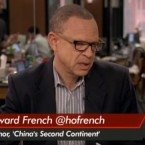
China is winning in Africa, author Howard French argues in his latest book China’s Second Continent. Can the US still catch up with China in Africa, he wonders in BusinessWeek. Some serious rethinking is needed.
Howard French:
China’s dreams of Africa are not unlike the Western dreams of China over the past century, which consisted of an immense volume play: a vision of selling a yard of cloth or a gadget or a bauble to every Chinese person. The only difference is that the Chinese are increasingly in a position to make their dream come true.
Anyone who travels in Africa today can see that vision being patiently implemented. It consists of gradually familiarizing consumers with Chinese products, from mattresses to mobile phones. Building brand equity in the markets of the West is daunting and prohibitively costly. The biggest and best Chinese brands are fighting for a toehold there, but for the most part China is placing its chips on this demographic end run in Africa, seeing past the aging, debt-saturated markets of the West.
Where does this leave the U.S. and others who have been sleeping on Africa? The mature, rich economies have little interest in competing with China in low-end manufacturing and cheap consumer goods. That said, there is a worrisome complacency in the U.S. corporate world about the continent, which leaves an open path for China to move up the value chain in African markets.
The Obama administration, which has generally made little impression on the continent, has been smart to push electricity generation as a priority aim in Africa. Over the past decade or so, China has been the main actor in terms of African infrastructure development, with its companies racking up huge profits constructing highways, ports, airports, and railway systems. The continent is as underserved in electrical power as it is in roads, and this is a sector in which the U.S., if it is disciplined and ambitious, can make a huge difference in the years ahead, doing good while doing well. The Obama initiative, known as Power Africa, was announced in June 2012. It relies on a mixture of government and private financing and aims to double the African electricity supply, by adding 10,000 megawatts to production. A recent Senate bill proposes doubling that goal.
Being disciplined means not only maintaining consistent priorities toward Africa, but also rethinking how one talks about the continent. The U.S. corporate world is in need of massive reeducation about Africa, and Washington must learn to speak about opportunity there without muddling the message with talk of terrorism and security, which have increasingly dominated U.S. policy toward the region since the end of the Cold War. Obama’s pan-Africa summit, starting on Aug. 4 in Washington, is a chance to start making a difference.
Howard French is a speaker at the China Speakers Bureau. Do you need him at your meeting or conference? Do get in touch or fill in our speakers´request form.
Are you interested in more experts on China´s outbound investments at the China Speakers Bureau? Do have a look at our recent list.






